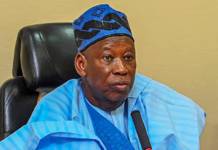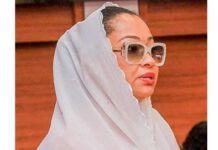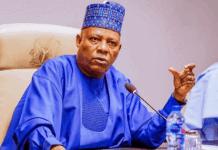Concerns as US Congressman Alleges USAID Funded Boko Haram
CHIGOZIE AMADI
The damning revelation by a United States Congressman, Scott Perry that the United States Agency for International Development (USAID), funded terrorist organisations, including Boko Haram, to the tune of $697 million annually has elicited concerns by some security experts and diplomats in Nigeria.
Perry, a Republican representing Pennsylvania, made this assertion during a hearing of the Subcommittee on Delivering on Government Efficiency, citing alleged misappropriations of taxpayer funds.
According to Perry, USAID’s reported funding of $136 million for building 120 schools in Pakistan has yielded “zero evidence” of the schools’ construction.
He also questioned the allocation of $60 million annually for the Women’s Scholarship Endowment and $5 million annually for the Young Women Lead program, suggesting that these funds may be supporting terrorism instead of empowering women.
The allegations sparked concerns about the misuse of taxpayer funds and the potential support of terrorist activities.
US President Donald Trump had suspended USAID and other aid programmes, accusing them of corruption.
But reacting to this troubling disclosure by a top US government official, a former Director, Department of State Service (DSS), Mike Ejiofor said this was not a surprise as the Chief of Defence Staff (CDS), had in the past also alleged that international non- governmental organisations were surreptitiously collaborating with terrorists in Nigeria.
He stressed that this was a kind of confirmation of that allegation.
The retired undercover cop expressed the need for further interrogation of the subject matter by the National Assembly and the security agencies to ascertain the veracity or otherwise of the grievous allegation.
Alleging that most of these foreign governmental and non-governmental agencies were mostly fronts, Ejiofor averred that the possibility of their culpability could not be ruled out.
On whether the government should ban such aid agencies operating in crisis-prone areas in Nigeria, the former Director said, “until investigations is concluded and culpability established.”
He added, “It is only then that the government can take decisive action.
On his advice to the government on the matter, he said, “proper investigation should be carried out by the national assembly since the revelation was made by the congress.
“The Department of State Service (DSS), the National Intelligence Agency (NIA), and other security agencies should all be involved in the investigation to establish the veracity of the allegation.”
In his contribution, an international affairs analyst, Dr. Ambrose Igboke, said this was not the first time the super-powers would be doing such kind of thing, adding that they are known for this.
He alleged that some developed countries fund crisis around the world to orchestrate regime change or for other purposes such as economic interest.
“It is for this reasons that serious countries like Russia, and China often reject this international aid. They don’t allow these aid agencies to come close to their countries because of this,” he said.
He noted that the kind of sophisticated weapons Boko Haram and other terrorist organisations like ISWAP were using showed that they are funded internationally.
The CEO of Beacon Security and Intelligence Limited, Kabir Adamu, said in the realm of foreign service, the allegation was not new.
He stated that espionage and foreign service have been issues that have been on the table for a very long time, adding that the current U.S. administration was only washing its dirty linen in public.
He, however, stressed that the US congressman failed to establish the nexus between Boko Haram and al-Qaeda.
He stressed that within the realm of espionage, “it is very difficult to put it on the table, to say this is the country, because they don’t do it directly, they do it through layers. And remember earlier on we admitted to the fact that there is a link between espionage and the Taliban”.
He noted that the creation of Taliban was, to an extent, between the U.S. and the Russians, and the monster became what it became at the moment.
“The point I’m trying to make is, in Nigeria it’s possible, but the onus should be on us as a people, not just to identify, but to limit the ability with which this is happening,” he said.

























